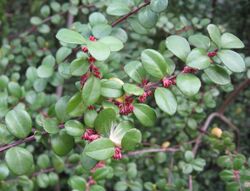Biology:Myrsine africana
| Cape myrtle | |
|---|---|

| |
| Male plant in flower | |
| Scientific classification | |
| Kingdom: | Plantae |
| Clade: | Tracheophytes |
| Clade: | Angiosperms |
| Clade: | Eudicots |
| Clade: | Asterids |
| Order: | Ericales |
| Family: | Primulaceae |
| Genus: | Myrsine |
| Species: | M. africana
|
| Binomial name | |
| Myrsine africana | |
Myrsine africana, also called Cape myrtle, African boxwood or thakisa, is a species of shrub in the family Primulaceae. It is indigenous to Southern and Eastern Africa, the Azores, the Arabian Peninsula, South Asia and East Asia.[1]
Description
The shrub can achieve heights of over 2 metres (6.6 ft) and may be dense if pruned or grown in strong sunlight. The fine-toothed leaves are at first deep red, but on maturity become glossy and dark green. The cream-coloured flowers appear in spring, with the male flowers boasting red anthers. Separate shrubs produce either male or female flowers, with the female plants also producing small purple berries. The foliage is dense, and dark-green to red in color. The hardy plant is long-lived.
M. africana sends up occasional shoots from its root system that go on to form new plants. It propagates easily from seed.
Uses
Parts of the plant are used in milk and meat-based soups by the Batemi and Masai people of Africa, which is thought to reduce cholesterol levels in tribes that consume large amounts of meat.[2] The flowers are also eaten.[2]
Cape myrtle is increasingly popular for topiaries and small hedges, as it can so readily be pruned and shaped.
Gallery
References
- ↑ "Myrsine africana L.". Catalogue of Life. https://www.catalogueoflife.org/data/taxon/45DQH.
- ↑ 2.0 2.1 Pieroni, Andrea (2005). Prance, Ghillean; Nesbitt, Mark. eds. The Cultural History of Plants. Routledge. p. 31. ISBN 0415927463.
External links
Wikidata ☰ Q3206290 entry
 |





